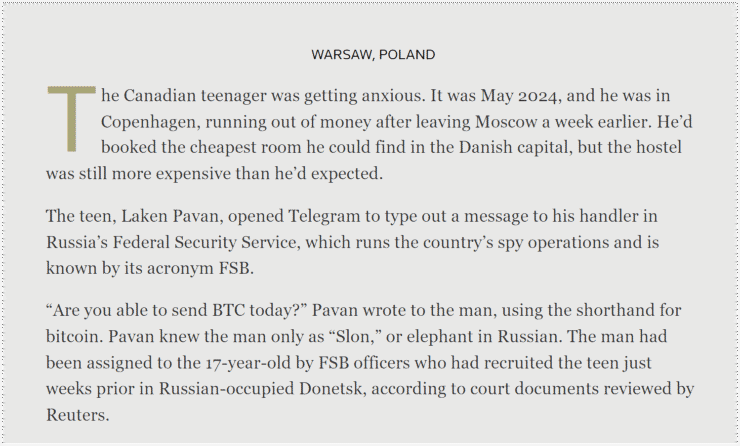Russian intelligence agencies are covertly funding untrained operatives—including teenagers—using cryptocurrency, according to a bombshell Reuters investigation. The probe highlights how Bitcoin has quietly become a backbone for Russia’s modern espionage infrastructure across Europe.
One of the most startling cases involves 17-year-old Canadian citizen Laken Pavan, who traveled to Donetsk in 2024 to join the pro-Russian Interbrigades. Upon arrival, he was reportedly detained by agents from Russia’s Federal Security Service (FSB) and coerced into becoming an undercover asset.

The report details how Pavan was assigned a handler—codenamed “Slon,” the Russian word for elephant—and ordered to carry out surveillance missions across multiple European cities. His journey took him from Donetsk to Istanbul and then Copenhagen, where he received a $500+ Bitcoin payment for his initial assignment. A day later, he crossed into Warsaw and voluntarily surrendered to Polish authorities.
Blockchain Links FSB to $600M in Bitcoin Transfers
Though Pavan’s short-lived role ended with his defection, the Bitcoin trail he left exposed a much larger network. Blockchain analytics firms Global Ledger and Recoveris traced his payment through two intermediary wallets linked to a high-traffic Bitcoin address that has handled over $600 million since June 2022.
Analysts noted that wallet activity followed Moscow business hours, further implicating Russian state actors. The largest address under scrutiny had direct ties to Garantex, a Russia-based crypto exchange sanctioned by the U.S. Treasury for facilitating illicit finance.
While investigators stopped short of naming a wallet owner, patterns of fund movement—including fund splitting, coin mixing, and routing through unconnected deposit wallets—strongly point to the FSB as the likely operator. Global Ledger characterized the transactions as “structured laundering designed for plausible deniability.”
Russia’s Digital War Chest: Espionage, Sabotage, and Propaganda
The use of crypto to fund Pavan’s mission is not an isolated case. According to Recoveris CEO Marcin Zarakowski, similar schemes have been uncovered in recent years, many involving teenagers or young adults from Belarus and Ukraine operating inside Poland.
These operatives allegedly conducted surveillance missions targeting railway infrastructure used to supply aid to Ukraine. Their tasks included installing covert cameras, painting graffiti with anti-NATO or divisive slogans, and spreading disinformation through burner social media accounts.
In some cases, crypto was used to fund acts of sabotage—such as small-scale arson attacks—raising the stakes of what experts now call “digitally enabled hybrid warfare.”
Beyond Poland, investigators believe Bitcoin and other cryptocurrencies have been funneled to mercenary groups fighting in Donbas, as well as European political influencers paid to spread Kremlin-aligned narratives designed to weaken public support for Ukraine.
Quick Facts
- A 17-year-old Canadian was paid in Bitcoin to spy for Russia
- Blockchain traces the funds to wallets tied to the Russian FSB
- Over $600M in BTC linked to these wallets since mid-2022
- Crypto-funded operatives have also committed sabotage and propaganda
- Sanctioned exchange Garantex was involved in laundering operations





